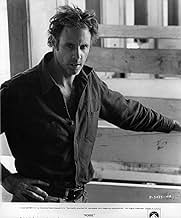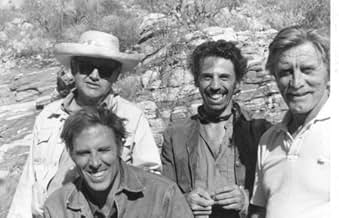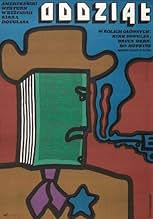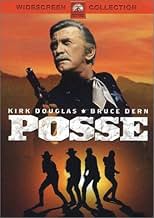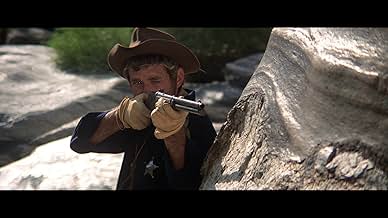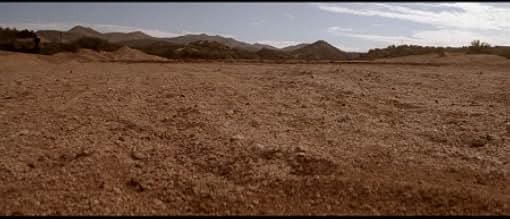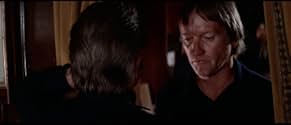CALIFICACIÓN DE IMDb
6.5/10
2.6 k
TU CALIFICACIÓN
Un alguacil político sin escrúpulos y sus ayudantes persiguen a una banda de ladrones de trenes cuyo líder demuestra que cada hombre tiene su precio.Un alguacil político sin escrúpulos y sus ayudantes persiguen a una banda de ladrones de trenes cuyo líder demuestra que cada hombre tiene su precio.Un alguacil político sin escrúpulos y sus ayudantes persiguen a una banda de ladrones de trenes cuyo líder demuestra que cada hombre tiene su precio.
- Dirección
- Guionistas
- Elenco
- Premios
- 1 nominación en total
William H. Burton
- McCanless
- (as Bill Burton)
Opiniones destacadas
This outlandish and politically incorrect Western concerns about an ambitious, pompous sheriff named Nightingale (Kirk Douglas) he's looking for a dangerous robber as platform for his US Senate political career, under the ironic title ¨To the polls, sons of freedom¨. When Jack Strawhorn (Bruce Dern)is double-crossed , he escapes and seek vengeance against Penstleman(David Canary). Later on , Strawhorn is captured and carried a town . After that, happens the getaway and Jack want to take over the loot that was taken him. Then Nightingale finds townspeople are siding with the bandit.
There's much historical revisionism in this offbeat and pleasantly subversive Western as well as reversals of the ordinary 'Good guy' against 'Bad guy' format, similarly as happens in Spaghetti Western sub-genre. ¨Posse¨ attempts at a new rendition the Old West but at its core it's throughly conventional. Excellent Kirk Douglas as cynical sheriff who tries to fulfill political aspirations by detaining a known gunfighter. Bruce Dern steals the show as intelligent and resourceful outlaw . Secondary cast is frankly well as Dick O'Neill as ubiquitous photographer recording everything for future , James Stacy as cripple journalist, the Mexican Alfonso Arau who recently turned into film-maker, and Luke Askew and Bo Hopkins as members of the marshal bunch. This over-directed and fine-written movie extends to style as well as content, though packs some bit flaws. Colorful cinematography by Fred Koenekamp (Patton) and atmospheric musical score by Maurice Jarre (Doctor Zivago, Laurence of Arabia). This solid motion picture is well produced and directed by Kirk Douglas . Kirk's direction and production was taken in various films as ¨The light at the edge of the world¨, ¨Brotherhood¨, ¨Grand Prix¨, ¨Paths of glory¨ but he only directed ¨ Scalawag¨ and ¨Posse¨, though he told that made some scenes of ¨Spartacus. Rating : 6,5, good and well worth watching.
There's much historical revisionism in this offbeat and pleasantly subversive Western as well as reversals of the ordinary 'Good guy' against 'Bad guy' format, similarly as happens in Spaghetti Western sub-genre. ¨Posse¨ attempts at a new rendition the Old West but at its core it's throughly conventional. Excellent Kirk Douglas as cynical sheriff who tries to fulfill political aspirations by detaining a known gunfighter. Bruce Dern steals the show as intelligent and resourceful outlaw . Secondary cast is frankly well as Dick O'Neill as ubiquitous photographer recording everything for future , James Stacy as cripple journalist, the Mexican Alfonso Arau who recently turned into film-maker, and Luke Askew and Bo Hopkins as members of the marshal bunch. This over-directed and fine-written movie extends to style as well as content, though packs some bit flaws. Colorful cinematography by Fred Koenekamp (Patton) and atmospheric musical score by Maurice Jarre (Doctor Zivago, Laurence of Arabia). This solid motion picture is well produced and directed by Kirk Douglas . Kirk's direction and production was taken in various films as ¨The light at the edge of the world¨, ¨Brotherhood¨, ¨Grand Prix¨, ¨Paths of glory¨ but he only directed ¨ Scalawag¨ and ¨Posse¨, though he told that made some scenes of ¨Spartacus. Rating : 6,5, good and well worth watching.
U.S Marshal Howard Nightingale is a man who has big political aspirations and to achieve this dream. He and his posse of deputies go after an out-law Jack Strawhorn. When Nightingale captures Strawhorn, just like his other captors or conquests he exploits it through the media for public support. Strawhorn would be Nightingale's ticket into the US senate, but Strawhorn thinks otherwise.
Can westerns be too low-key? 'Posse' felt so. Kirk Douglas directs and stars in this understated, but thoroughly ambitious under-the-radar western that had something cynical to say when it came to its closing credits. Quite heavy-handed and aware of its messages (money buys loyalty with the guys donning their badges being no better than the outlaws and representing an image (the people's?) to manipulative achieve a politically upper-hand), but the story's format is just so odd and subversive. The western conventions are there, but by the end William Roberts and Christopher Knopf's cleverly sharp (if sly) material basically turned it upside down with an ironic turn of events. It has that fragrance of the pioneer Hollywood westerns, but its punishing violence and sexual inclusions with a quiet, but powerful conclusion roots it in the 70s. The unusual theme to it and the effortlessly collected and cool-witted performances of Kirk Douglas and Bruce Dern (who shared a terrific chemistry) cover for how mechanical the film did look. Nothing totally skillful or stylish about it. Douglas' direction is raggedly rough and a little too plain. However some action shootouts and chase sequences were competently entertaining, but when the violence did hit, it wasn't presented in such a meaningless parade. It went hand-to-hand with the thoughtful nature of the script. Dick O'Neill's taut, but at times flashy photography is fluidly shot and Maurice Jarre's uncanny score is strongly delivered. Supporting Douglas and Dern (who's character's made great for sparing confrontations) is excellent performances by Bo Hopkins, James Stacy, Beth Brickell, Dick O'Neill and Alfonso Arau. A western that's too interesting to pass up because of the calculating tone lurking underneath.
Can westerns be too low-key? 'Posse' felt so. Kirk Douglas directs and stars in this understated, but thoroughly ambitious under-the-radar western that had something cynical to say when it came to its closing credits. Quite heavy-handed and aware of its messages (money buys loyalty with the guys donning their badges being no better than the outlaws and representing an image (the people's?) to manipulative achieve a politically upper-hand), but the story's format is just so odd and subversive. The western conventions are there, but by the end William Roberts and Christopher Knopf's cleverly sharp (if sly) material basically turned it upside down with an ironic turn of events. It has that fragrance of the pioneer Hollywood westerns, but its punishing violence and sexual inclusions with a quiet, but powerful conclusion roots it in the 70s. The unusual theme to it and the effortlessly collected and cool-witted performances of Kirk Douglas and Bruce Dern (who shared a terrific chemistry) cover for how mechanical the film did look. Nothing totally skillful or stylish about it. Douglas' direction is raggedly rough and a little too plain. However some action shootouts and chase sequences were competently entertaining, but when the violence did hit, it wasn't presented in such a meaningless parade. It went hand-to-hand with the thoughtful nature of the script. Dick O'Neill's taut, but at times flashy photography is fluidly shot and Maurice Jarre's uncanny score is strongly delivered. Supporting Douglas and Dern (who's character's made great for sparing confrontations) is excellent performances by Bo Hopkins, James Stacy, Beth Brickell, Dick O'Neill and Alfonso Arau. A western that's too interesting to pass up because of the calculating tone lurking underneath.
Well, not 'the best', perhaps, but an interesting and stylish western starring Kirk Douglas, who also produced and directed it. Bruce Dern is great as Strawhorn, the bad guy who ends up stealing the show.
Howard Nightingale is running for a seat in the US Senate. He is a man of great complexity, and one trait very much to the fore in his personality is a ruthless desire to impress the voters. He has assembled a posse of rangers, his own personal uniformed army of crimebusters. Nightingale (played by Douglas) has calculated that he can win the election on a clear-the-territory-of-lowlifes ticket. He and his posse are hunting down Strawhorn, and have fitted out a crusade train for the purpose of capturing their prey. The plan is to grab Strawhorn and hang him just in time for the election.
Nightingale is in the pocket of the railroad owners. The local newspaper is the Tesota Sentinel, and one of the film's themes is the valuable role played by the press in speaking truth to those in power. One-armed, one-legged journalist Harold Hellman (played by James Stacy, who had recently lost both limbs on a motor cycle accident) is the equal of the photogenic wannabe Senator. Nightingale works the crowd with glib words, but his position is being eroded by a different formula of words - that used by The Sentinel.
One of the film's elegant touches is the photography motif. At various points in the story, the participants pose to have their picture taken, and the resulting stills form a freeze-frame chronicle of the action. A lot of post-production work went into dubbing extraneous voices onto the soundtrack, so that the crowd scenes are laced with apposite little remarks.
A violently-burning train provides terrific visuals, as well as offering acerbic comment on Nightingale's political aspirations. The film's concluding message, that by its nature a standing army is a threat to democracy, is well made - as is the point about the fickleness of public opinion.
Verdict - A clever, enjoyable little western.
Howard Nightingale is running for a seat in the US Senate. He is a man of great complexity, and one trait very much to the fore in his personality is a ruthless desire to impress the voters. He has assembled a posse of rangers, his own personal uniformed army of crimebusters. Nightingale (played by Douglas) has calculated that he can win the election on a clear-the-territory-of-lowlifes ticket. He and his posse are hunting down Strawhorn, and have fitted out a crusade train for the purpose of capturing their prey. The plan is to grab Strawhorn and hang him just in time for the election.
Nightingale is in the pocket of the railroad owners. The local newspaper is the Tesota Sentinel, and one of the film's themes is the valuable role played by the press in speaking truth to those in power. One-armed, one-legged journalist Harold Hellman (played by James Stacy, who had recently lost both limbs on a motor cycle accident) is the equal of the photogenic wannabe Senator. Nightingale works the crowd with glib words, but his position is being eroded by a different formula of words - that used by The Sentinel.
One of the film's elegant touches is the photography motif. At various points in the story, the participants pose to have their picture taken, and the resulting stills form a freeze-frame chronicle of the action. A lot of post-production work went into dubbing extraneous voices onto the soundtrack, so that the crowd scenes are laced with apposite little remarks.
A violently-burning train provides terrific visuals, as well as offering acerbic comment on Nightingale's political aspirations. The film's concluding message, that by its nature a standing army is a threat to democracy, is well made - as is the point about the fickleness of public opinion.
Verdict - A clever, enjoyable little western.
Released in 1975, "Posse" is a Western starring Kirk Douglas and Bruce Dern. Douglas plays, Nightingale, a marshal campaigning for the Senate in West Texas while Dern plays Strawhorn, a notorious outlaw leader whom Nightingale wants to bring in to increase his chances of winning the election. Bo Hopkins is on hand as one of the marshal's deputies while James Stacy plays a newspaper editor who opposes the marshal's campaign.
The movie debuted a year after Nixon resignation due to the Watergate scandal and "Posse" takes advantage of the public's loss of trust in politicians. Nightingale (Douglas) and his deputies are juxtaposed with Strawhorn (Dern) and his losers. There's no overt message, however, until the last 20 minutes. Speaking of which, the twist of the climax initially turned me off and filled me with disgust. But, after reflecting on it, I saw what the movie was getting across and respected it. It's just that the way the message is conveyed is awkwardly implemented. It could've been done more smoothly.
Some critics mistake the film's message as comparing a (supposedly) corrupt politician with a (supposedly) honest lawbreaker, but this is inaccurate. For one thing, "honest lawbreaker" is an oxymoron, particularly where Strawhorn is concerned. Right out of the gate the movie plainly shows him to be a murderous thug and, while a smooth-talker, he's never made out to be the good guy. He's a scumbag criminal worthy of hanging, impure and simple. Nor is Nightingale shown to be wickedly corrupt. He's a commanding marshal of the territory, which is a good thing; he has political aspirations and ties to the railroad, so what? Even when tempted by the blonde hottie Mrs. Ross (Beth Brickell) he charmingly turns her down on the grounds that it wouldn't be advantageous. Isn't that what wisdom is-having the scruples to recognize and deny foolish, immoral or destructive desires/behaviors? For more insights on the message of the movie remember that the film is called "Posse." See below for details.
Beyond the movie's message, "Posse" is a competent, entertaining Western with interesting characters, a quality cast and quite a bit of action.
The film runs 92 minutes and was shot in Sabino Canyon, Florence, Sonoita, Aravaipa Canyon and Old Tucson, Arizona.
GRADE: B-/C+
***SPOILER ALERT*** (Don't read further if you haven't seen the movie)
I didn't find the deputies' sudden shift to the life of outlawry to be believable. True, they would each have $6000, which would've taken three years for them to make doing honest work, but it wasn't like this was enough moolah to radically change their lives, not to mention they'd lose the prestige that came with being deputies; and the possibility of becoming marshals or sheriffs one day. No matter how you slice it, this was an awkwardly implemented twist and lowers my grade of the film.
That said, there were signs that the 'posse' were already bad (with the exception of one deputy who refused to betray Nightingale and turn to crime). For instance, at least three of them are shown secretly bedding some young babes from the town in a conveniently available boxcar. These nubile ladies were obviously attracted to the "bad boys," which just so happen to be 'upstanding deputies,' members of the brave posse. What else is new?
So what's the movie saying? The line between respectable profession and outlawry can be very thin. People can be in an honest occupation and be corrupt; they're essentially just masquerading. It happens everywhere all the time. One critic lambasted the film for it's "tortuous confusion of good and evil." Actually, the movie just sheds light on the existence of evil in places where people naively pull the wool over the eyes not to see it. Look no further than HeyLIARy.
What about Nightingale? Was he shady or just his men? I personally don't think he was. He struck me as an ambitious justice-seeking marshal with political ambitions and he refused to even consider an illicit sexual liaison. But it's not a good reflection on his character that the majority of his men were corrupt, so maybe he was too, at least a little; and it would overtly manifest down the line in office.
Despite my criticisms, any movie that can spur such questions is worth checking out.
The movie debuted a year after Nixon resignation due to the Watergate scandal and "Posse" takes advantage of the public's loss of trust in politicians. Nightingale (Douglas) and his deputies are juxtaposed with Strawhorn (Dern) and his losers. There's no overt message, however, until the last 20 minutes. Speaking of which, the twist of the climax initially turned me off and filled me with disgust. But, after reflecting on it, I saw what the movie was getting across and respected it. It's just that the way the message is conveyed is awkwardly implemented. It could've been done more smoothly.
Some critics mistake the film's message as comparing a (supposedly) corrupt politician with a (supposedly) honest lawbreaker, but this is inaccurate. For one thing, "honest lawbreaker" is an oxymoron, particularly where Strawhorn is concerned. Right out of the gate the movie plainly shows him to be a murderous thug and, while a smooth-talker, he's never made out to be the good guy. He's a scumbag criminal worthy of hanging, impure and simple. Nor is Nightingale shown to be wickedly corrupt. He's a commanding marshal of the territory, which is a good thing; he has political aspirations and ties to the railroad, so what? Even when tempted by the blonde hottie Mrs. Ross (Beth Brickell) he charmingly turns her down on the grounds that it wouldn't be advantageous. Isn't that what wisdom is-having the scruples to recognize and deny foolish, immoral or destructive desires/behaviors? For more insights on the message of the movie remember that the film is called "Posse." See below for details.
Beyond the movie's message, "Posse" is a competent, entertaining Western with interesting characters, a quality cast and quite a bit of action.
The film runs 92 minutes and was shot in Sabino Canyon, Florence, Sonoita, Aravaipa Canyon and Old Tucson, Arizona.
GRADE: B-/C+
***SPOILER ALERT*** (Don't read further if you haven't seen the movie)
I didn't find the deputies' sudden shift to the life of outlawry to be believable. True, they would each have $6000, which would've taken three years for them to make doing honest work, but it wasn't like this was enough moolah to radically change their lives, not to mention they'd lose the prestige that came with being deputies; and the possibility of becoming marshals or sheriffs one day. No matter how you slice it, this was an awkwardly implemented twist and lowers my grade of the film.
That said, there were signs that the 'posse' were already bad (with the exception of one deputy who refused to betray Nightingale and turn to crime). For instance, at least three of them are shown secretly bedding some young babes from the town in a conveniently available boxcar. These nubile ladies were obviously attracted to the "bad boys," which just so happen to be 'upstanding deputies,' members of the brave posse. What else is new?
So what's the movie saying? The line between respectable profession and outlawry can be very thin. People can be in an honest occupation and be corrupt; they're essentially just masquerading. It happens everywhere all the time. One critic lambasted the film for it's "tortuous confusion of good and evil." Actually, the movie just sheds light on the existence of evil in places where people naively pull the wool over the eyes not to see it. Look no further than HeyLIARy.
What about Nightingale? Was he shady or just his men? I personally don't think he was. He struck me as an ambitious justice-seeking marshal with political ambitions and he refused to even consider an illicit sexual liaison. But it's not a good reflection on his character that the majority of his men were corrupt, so maybe he was too, at least a little; and it would overtly manifest down the line in office.
Despite my criticisms, any movie that can spur such questions is worth checking out.
On screen I find Kirk Douglas to be without peer, but I have come to admire him as much if not more for his real-life advocacy of some highly unorthodox, yet worthy projects.
If this movie doesn't rank among his very best, it is still remarkable for how unapologetically it goes against the grain and makes a very bold personal statement (one that was not so popular at the time but resonates to this day). All the while he is producing and directing himself in what proves to be a rather unflattering role. I can't think of anyone else who would have the real-life grit to do such a thing - Kirk Douglas has done so repeatedly with aplomb.
If this movie doesn't rank among his very best, it is still remarkable for how unapologetically it goes against the grain and makes a very bold personal statement (one that was not so popular at the time but resonates to this day). All the while he is producing and directing himself in what proves to be a rather unflattering role. I can't think of anyone else who would have the real-life grit to do such a thing - Kirk Douglas has done so repeatedly with aplomb.
¿Sabías que…?
- TriviaThis movie was the first role for James Stacy following his 1973 motorcycle accident in which he was hit by a drunk driver, resulting in the loss of his left arm and left leg. Kirk Douglas created the role especially for Stacy.
- ErroresUS Senators were not directly elected at the time of the film's setting. They were appointed by State Legislatures until the 17th Amendment in 1913.
- Citas
Jack Strawhorn: Every day above ground is a good day.
- ConexionesReferenced in Talking Pictures: Allan Warnick, Supporting Actor in 'Chinatown' (2022)
- Bandas sonorasI've Been Working on the Railroad
(uncredited)
Traditional
The first line is sung during Nightingale's speech
Selecciones populares
Inicia sesión para calificar y agrega a la lista de videos para obtener recomendaciones personalizadas
- How long is Posse?Con tecnología de Alexa
Detalles
Taquilla
- Presupuesto
- USD 2,000,000 (estimado)
Contribuir a esta página
Sugiere una edición o agrega el contenido que falta

Principales brechas de datos
By what name was Posse (1975) officially released in India in English?
Responda

